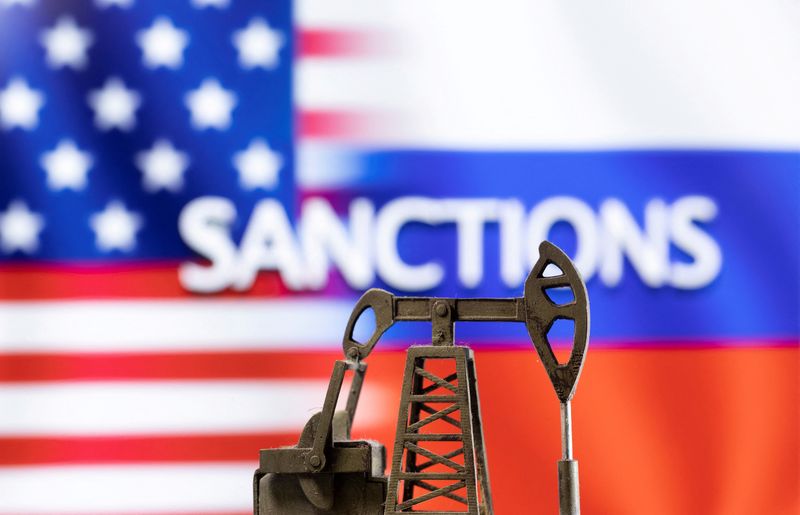By Nidhi Verma and Dmitry Zhdannikov
NEW DELHI/LONDON (Reuters) -The United States will impose some of the toughest sanctions yet on Russia’s oil industry, according to an alleged U.S. Treasury Department document circulating among traders in Europe and Asia that the global oil prices rose by 3% on Friday.
About 180 ships, dozens of traders, two major oil companies and several senior Russian oil executives are included in the sanctions, which have been reported to have pushed global oil prices above $80 a barrel. [O/R].
Reuters could not immediately verify the veracity of the document and the U.S. Treasury Department did not immediately respond to a request for comment.
The sanctions, imposed on Russia over its war in Ukraine, would cause serious disruption to Russian oil exports to its main buyers India and China, four Russian oil trading sources and three Indian refining sources said.
Refineries in India and China became the biggest buyers of Russian crude exports after the US, European Union and their allies imposed sanctions on Russia’s energy industry after Russia invaded Ukraine in 2022. Russia pumps out about 10% of the world’s oil supply.
Russian companies have adapted by buying their own fleet of tankers and insuring them in Russia rather than through Western marine insurance.
Washington will impose sanctions on two oil giants Gazprom (MCX:) Neft and Surgutneftegaz and marine insurance companies Ingosstrakh and Alfastrakhovanie that cover most of the ships supplying Russian oil to India, the document showed.
So far, hundreds of ships and many Russian oil traders have escaped the toughest U.S. sanctions as the Biden administration tried to balance calls for tougher measures against the risk of a global oil price surge.
President-elect Donald Trump, who takes office later this month, has promised to end the war in Ukraine. Tougher sanctions on Russian oil exports could give Trump more leverage in future peace talks, as Moscow relies on oil exports to sustain its economy and finance the conflict.
Indian refiners will refrain from carrying Russian oil in sanctioned tankers or in ships insured by sanctioned Russian insurers, the Indian refinery sources said, asking not to be named.
According to the document, the US Treasury Department would allow a transition period until March 12, allowing some energy-related transactions to be completed.
One of the Indian refining sources said new sanctions could push prices for Russian oil below $60 a barrel, after which Western shippers and insurers will be able to move the barrels under a Western-imposed price ceiling mechanism.
Gazprom Neft and Surgutneftegaz together export about 800,000 barrels of oil per day (bpd).
Leading Russian oil exporters Rosneft and Lukoil have so far managed to avoid the toughest US sanctions.
During his previous term as president, Trump regularly called on Saudi Arabia, de facto leader of the Organization of the Petroleum Exporting Countries (OPEC), to increase production to help lower oil prices.

Saudi Arabia is estimated to have at least 2 million barrels per day of spare capacity as the kingdom joins other OPEC members in curbing production to balance global supply and demand.
Russia produces about 9 million barrels per day and exports 4-5 million barrels per day of refined products.


